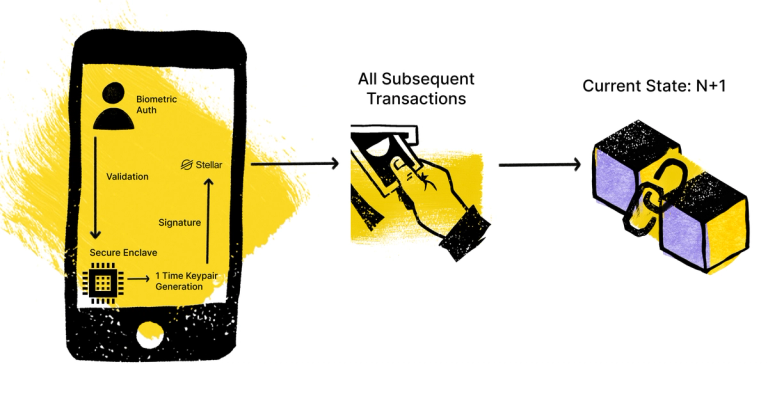Learn
What is a web3 smart wallet?
Smart wallets, or smart contract wallets, are digital cryptocurrency (crypto) wallets powered by smart contracts on a blockchain. Unlike traditional crypto wallets, smart wallets offer more powerful features that increase functionality, enhance security, and a smoother experience for managing digital assets.
Onboarding users into Web3 has continuously been a challenge in the blockchain space. Smart wallets have the potential to ease that friction, making blockchain more accessible and usable to the everyday user without sacrificing security.
Let’s further explore smart wallets, their capabilities, how they compare to traditional account-based crypto wallets, and what’s happening with smart wallets on the Stellar blockchain.

Onboarding users into Web3 has continuously been a challenge in the blockchain space. Smart wallets have the potential to ease that friction, making blockchain more accessible and usable to the everyday user without sacrificing security.
Let’s further explore smart wallets, their capabilities, how they compare to traditional account-based crypto wallets, and what’s happening with smart wallets on the Stellar blockchain.
What are the Benefits of Smart Wallets?
Increased functionality
As mentioned earlier, smart wallets are powered by smart contracts on a blockchain. Because of this, they can facilitate programmable logic for complex tasks, allowing for much more flexibility and a wider range of capabilities than traditional crypto wallets. Traditional crypto wallets are backed by accounts (a public and a private key) and are generally limited to basic functions such as sending and receiving digital assets and checking balances.
Alternatively, smart wallets can enable sophisticated, customizable, and automated financial tasks, including recurring payments (similar to a traditional bank account but with the transparency of the blockchain), fund allocation, and other transaction rules (e.g., requiring additional signatures for transactions above a certain value). In addition, since smart wallets are backed by smart contracts, it’s easier to integrate with other contracts directly to enable advanced DeFi activities such as staking, lending, or yield farming.
This increased functionality provides users with the flexibility to do more with their digital assets and perform actions that are not possible with traditional crypto wallets.
What are the Benefits of Smart Wallets?
Do smart contract wallets offer enhanced security?
In addition to increased functionality for financial tasks, smart wallets allow for a wider range of enhanced security mechanisms. Unlike traditional crypto wallets, smart wallets don’t rely solely on private keys for security but are designed to support several methods of access control.
Traditional crypto wallets exclusively leverage private keys and 12- to 24-word seed phrases to sign transactions and prove ownership of funds in the wallet; if the private key is lost or forgotten, access to the wallet’s funds is permanently lost. Security depends heavily on how well users protect and remember their private keys and seed phrases, which can be intimidating to those new to Web3 and blockchain.
Conversely, since smart wallets are powered by smart contracts, they offer a range of advanced security features. These include multi-signature approval (multiple private keys are needed to authorize transactions), account recovery (trusted individuals can help recover access to a wallet), spending limits (a limit on the amount of funds that can be transferred or spent within a certain period), time-locked transfers (a transaction that is executed only after a specified time or at a specific future date), and passkey support (more on this in the next section).
Having a larger array of security options takes the pressure off of users to record or remember their private keys and seed phrases.
What are the Benefits of Smart Wallets?
How do passkeys work with smart contract wallets?
Last but not least, smart wallets present a more seamless end-user experience than traditional crypto wallets. Seed phrases, private keys, and transaction fees can be difficult concepts to grasp for new users entering the Web3 space — the threat of losing your digital assets due to a forgotten private key or seed phrase is a scary thought. See this article that talks about a man who accidentally threw away the seed phrase to his account holding around 8,000 bitcoin.
Enter passkeys.
Passkeys are an alternative security mechanism that smart wallet users can leverage to access accounts and send transactions. Passkeys eliminate the need for users to remember their private keys or 12- to 24-word seed phrases and offer a faster, more intuitive, safer method of identity authentication. Passkeys use encrypted data stored on a device’s secure enclave and perform user verification with hardware tokens (like YubiKeys), biometric data (like fingerprints or facial recognition), or other cryptographic methods.
Key management has been a massive hindrance to blockchain’s mainstream adoption. Passkeys eliminate this barrier to entry, making Web3 more accessible and familiar to the everyday user.
Smart wallets can also simplify fee management by automating the calculation of transaction fees, offering fee abstraction and feeless transactions, and providing tools for optimizing and controlling transaction costs. These features make interacting with blockchain networks more user-friendly, especially for those who may find the traditional fee management process complex or confusing.

Smart wallets on the Stellar network
In 2024, Stellar launched smart contracts on mainnet with Protocol 20, followed by Protocol 21 enabling secp256r1 verification, enhancing usability with passkey-powered smart wallets. This allows users to use passkeys instead of private keys, simplifying blockchain interactions.
Smart wallets: ushering in future users of blockchain
Smart wallets offer significant advancements for managing digital assets in blockchain ecosystems. By leveraging smart contracts, smart wallets provide enhanced functionality, improved security, and a superior user experience compared to traditional account-based cryptocurrency wallets.
As the blockchain industry continues to grapple with onboarding new users into Web3, smart wallets stand out as a solution that can significantly ease the process. They provide users with a more accessible way to engage with blockchain technology while maintaining the high-security standards essential in the Web3 space.
Take a look at all the awesome passkey and smart wallet projects being built on Stellar in the Smart Wallet section of the Stellar Developer Docs! If these projects inspire you, go ahead and experiment with passkeys on your own and share your findings in the #passkeys channel in the Stellar Developer Discord.
Connect
Want to know more?
To learn more about Soroban, please still out the form.
Explore Next